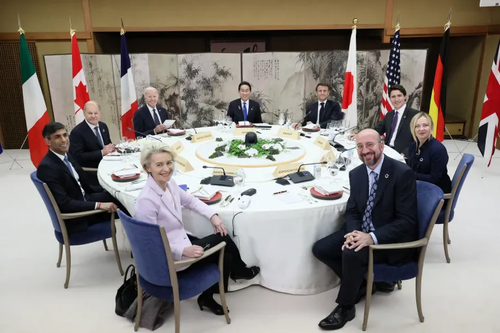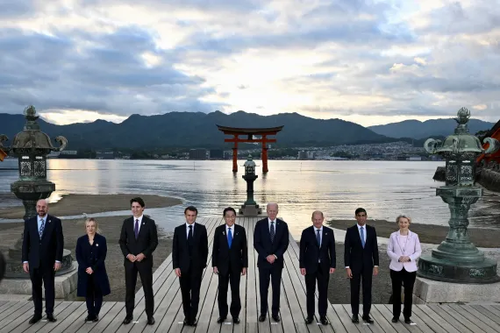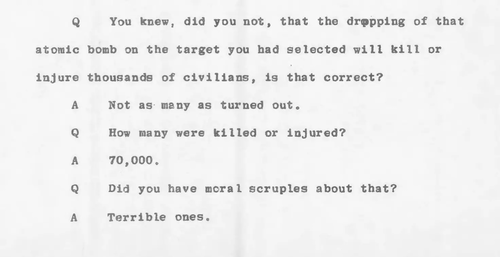G7 Day 1: Leaders Lecture Russia, China On Nuclear De-escalation While Standing In City Nuked By US
Russia and the Ukraine war are of course high on the agenda for G7 leaders meeting in Hiroshima, Japan starting Friday. Given the venue, the summit kicked off Friday morning with the heads of state laying wreaths at the Hiroshima Peace Memorial Park in commemoration of tens of thousands killed when the US dropped an atomic bomb on the city on August 6, 1945.
Japanese Prime Minister Fumio Kishida welcomed the leaders from the US, Canada, France, Germany, Italy, and United Kingdom for the meeting which is being held May 19 -21. EU officials are also present. Speaking from a city which was literally nuked, the G7 leaders called for a "world without nuclear weapons"... but this was aimed only a certain nations, given the statement singles out Russia, Iran, China and North Korea to embrace non-proliferation. The irony was lost on the Western officials, apparently.

The G7 leaders blasted Moscow's plans to send nuclear weapons to Belarus as "dangerous and unacceptable" and urged for the reimplementation of conformity to the terms of the New START treaty. And on China, the G7 statement said: "China’s accelerating build-up of its nuclear arsenal without transparency nor meaningful dialogue poses a concern to global and regional stability."
The leaders further said that support of Ukraine is crucial to global stability and peace, with German Chancellor Olaf Scholz saying "We have once again assured that we will give Ukraine the necessary support for as long as that is required" - in a press briefing on the first day.
Concerning Russia, the US took the opportunity to unveil expanded sanctions:
The Biden administration has added 71 companies to a trade blacklist for supporting Russia.
The US Department of Commerce’s action targets support for Russia’s military and expands the scope of export controls on Russia and Belarus. The blacklist includes 69 Russian entities, one from Armenia and one from Kyrgyzstan.
The new export controls target oil and gas projects in Russia and Belarus, Commerce said. Other companies include aircraft repair and parts production plants, gunpowder, tractor and car factories, shipyards and engineering centres in Russia.
And this amid reports commenting on the 'success' on the Russian oil price cap...
"Following the implementation of the price cap policy, Russia’s oil revenues have fallen substantially compared to both pre-war levels and the elevated level at the onset of the war," the Treasury said in a fresh report. "Despite selling a consistent volume of oil, Russia makes far less revenue on each barrel because its oil now trades at a significant discount relative to Brent crude, the global benchmark oil price," the report emphasized.

President Biden on the first day had this key announcement to G7 allies concerning what's highest on Kiev's "weapons shopping list":
President Joe Biden informed G7 leaders on Friday that the US will support a joint effort with allies and partners to train Ukrainian pilots on fourth generation aircraft, including F-16s, a senior administration official tells CNN.
The training is not expected to happen in the US, the official said, and will likely happen entirely in Europe. But US personnel will participate in the training alongside allies and partners in Europe, the official said. It is expected to take several months to complete.
“As the training takes place over the coming months, our coalition of countries participating in this effort will decide when to actually provide jets, how many we will provide, and who will provide them,” the official said.
There's been talk among Western allies of forming a 'fighter jet coalition' - which Zelensky has been pushing for. The Ukrainian leader is expected to travel to Japan in order to address G7 leaders in person. On Friday he addressed the Arab League summit meeting in Saudi Arabia, and further met face-to-face with crown prince MbS.
Protests in the city which the United States nuked in WWII...
Protests in Hiroshima against US🇺🇸 President Joe Biden’s visit for the G7 Summit. Biden refuses to apologise for the US using a nuclear bomb on the city in 1945, which killed 140,000 people. After the bombing, the US covered up the effects of radiation on the population by… pic.twitter.com/usauojFtEZ
— Going Underground (@GUnderground_TV) May 19, 2023
Most estimates put the number of Japanese civilians killed by the Hiroshima nuclear bomb dropped from an American plane at 70,000 or more killed. According to The Bulletin of the Atomic Scientists:
Such numbers were large, and appear to have had a sobering effect on President Harry S. Truman. After the August 9 Nagasaki raid (which he had no apparent foreknowledge of), he would put a stop to further bombing, telling his cabinet that “the thought of wiping out another 100,000 people was too horrible,” according to an August 10, 1945, diary entry by then-Secretary of Commerce Henry A. Wallace. It is not clear that Truman had any real sense of how many casualties there would have been prior to the attacks. The only pre-Hiroshima estimate on record is the recollection from Arthur Compton that at a May 31, 1945, meeting of the Interim Committee, J. Robert Oppenheimer had suggested that an atomic bomb dropped would kill “some 20,000 people” if exploded over a city. This is not recorded in the meeting minutes, nor in any other report or correspondence, so it does not seem that this estimate had any special weight to the participants. (Compton amended that this estimate had assumed people would seek shelter; given that no warning was issued for the attacks, this did not occur.)
Oppenheimer would comment obliquely on this variance in before-and-after estimates during the hearing on his security clearance in 1954:
Meanwhile, Rabobank comments as follows on what can be expected concerning 'punishing' Russia at the G7, also as the escalatory idea of an outright export ban is still floating around...
"There appears to be a strong commitment by the G7 to support Ukraine and tighten the economic noose on Russia. Sanctions will be broadened to a wider group of goods, especially those that could facilitate Russia’s war effort. According to Bloomberg, the latest draft of a statement does not talk about a near outright ban on exports to Russia, though."
"Meanwhile, existing sanctions will be tightened by removing loopholes to circumvent them. This would include the strengthening of enforcement in regards to third countries through which Russia is importing banned goods. One key risk here is that the G7 (plus ‘coalition of the willing’) drive a wider gap between them and those countries that have taken on a more ‘neutral’ stance in the matter."
https://ift.tt/uWC8dpH
from ZeroHedge News https://ift.tt/uWC8dpH
via IFTTT





0 comments
Post a Comment